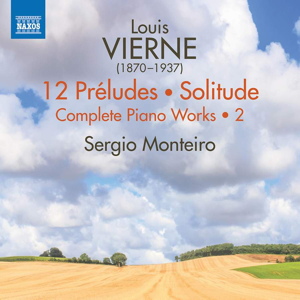
Louis Vierne (1870-1937)
Complete Piano Works 2
Douze Préludes, Op 36 (1914-15)
Solitude, Op. 44 (1918)
Pièce pour piano, Op.49 ‘Ainsi parlait Zarathoustra’ (1922)
Air à danser (1910)
Airs de danse (c.1911-12)
Sergio Monteiro (piano)
rec. 2022, Small Rehearsal Hall, Wanda Bass School of Music, Oklahoma City University, USA
Naxos 8.574480 [77]
Louis Vierne is among that group of late nineteenth and twentieth century French composers whose organ music has become well known in the English-speaking world, but who also wrote prodigiously in other forms and for other, very different forces. Vierne’s great contemporary, Charles Tournemire, wrote no less that 8 orchestral Symphonies, which are all but unknown outside France. Vierne composed extensively for choirs, chamber groups, an orchestral symphony and a number of distinguished examples of French mélodie. His complete piano works fill two compact discs of which this is the second. While the organ symphonies might be described as the composer’s public utterances, the music for piano allow us to glimpse the inner man, one beset with difficulties and tragedy. As an organ recitalist of international renown and holder of one of the most iconic organists’ posts in the world, the Cathedral of Notre Dame, Paris he would naturally include his own music in his programmes, drawing on both the symphonies and the Pièces de Fantasie , the four sets of character pieces which are very largely, but not exclusively intended for concert use. By contrast, his piano music seems only to have had currency among more private circles and some was only published for the first time in 2008, when the publisher Bärenreiter issued their complete edition of Vierne’s piano works.
The disc opens with a set of Preludes, written at the beginning of the First World War. One is tempted to make a comparison with Rachmaninov’s sets of Preludes for piano, Opp. 23 and 32, which are earlier, 1903 to 1910. These are some of the most demanding and it must said, extrovert sets of short works for solo piano, where virtuosity is a sine qua non and the element of technical display is very prominent, although the more intimate and reflective side of Rachmaninov’s musical personality is far from absent. In Vierne’s case the style is serious, the musical design skilfully conceived and with a remarkable absence of sentimentality. A closer point of comparison would be with Chopin’s set of Preludes Op. 24, where the intimacy and brevity of each movement are distinctly similar. While the technical challenges may not be as extreme, the challenge for the interpreter is to project the somewhat bleak emotional landscape inhabited by this music, while still holding the listener’s attention. In any event this is probably not a disc to listen to at a single sitting.
Perhaps the most remarkable single work included here is the four-movement suite Solitude, Op. 44. Written in 1918 in the aftermath of the deaths of both his eldest son by suicide and his brother in action during the war. As Peter Siepmann, the author of the excellent booklet notes states, ‘Each of the movements bears an epitaph in addition to its title. … (The second movement) takes the chromaticism of Vierne’s harmonic language to the bounds of atonality in an extended and rhythmically hypnotic meditation before a tumultuous outburst in the central section’. This is not an exaggeration; Vierne pushes against the limits of tonality in way which must have startled the earliest listeners.
One genuine curiosity is the short, single Pièce pour piano, Op. 49 which bears the title Ainsi parlait Zarothoustra and draws on the same work of philosophical fiction as Richard Strauss’s equally celebrated tone poem under the same title. It is intriguing to note Vierne’s difference of approach to Nietzsche’s musings; where Strauss invokes the epic and the universal, Vierne uses a variety of different styles, starkly juxtaposed to express the philosopher’s wide-ranging thoughts, yet manages to make a compact musical statement of less than five minutes length.
Having dwelt at considerable length on the qualities of the music, some comment on the performances is overdue. Sergio Monteiro is a former winner of the Martha Argerich International Piano Competition and has complete technical and interpretive command of this sometimes-elusive music. Throughout the disc the listener’s attention is held, even though, at first sight the emotional atmosphere might seem a little forbidding, given the place in his emotional life that Vierne’s piano music would seem to occupy. This is a disc to which listeners will want to return.
Martyn Strachan
Help us financially by purchasing from





















